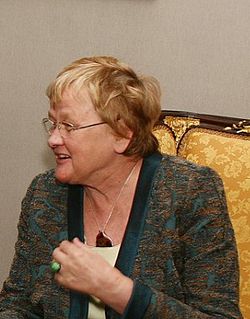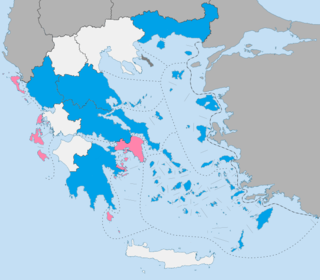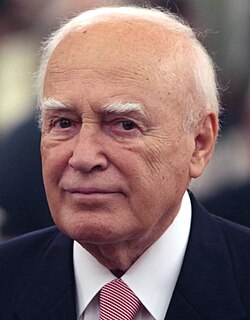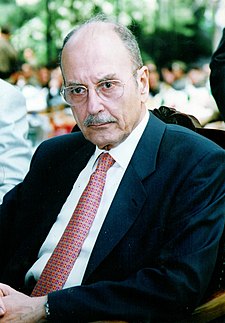
The United States presidential election of 1792 was the second quadrennial presidential election. It was held from Friday, November 2 to Wednesday, December 5, 1792. Incumbent President George Washington was elected to a second term by a unanimous vote in the electoral college, while John Adams was re-elected as vice president. Washington was essentially unopposed, but Adams faced a competitive re-election against Governor George Clinton of New York.

The President of the Hellenic Republic, colloquially referred to in English as the President of Greece, is the head of state of Greece. The President is elected by the Hellenic Parliament, and his role is mostly ceremonial since the 1986 constitutional reform. The office was formally established by the Constitution of Greece in 1975, but has antecedents in the Second Hellenic Republic of 1924–1935 and the republic established by the Greek military junta in 1973–1974. The incumbent, since 2015, is Prokopis Pavlopoulos, serving his first term in office.
The Federal Convention, also known as the Federal Assembly, is a special constitutional body in the political and federal institutional system of Germany, convened solely for the purpose of electing the President of the Federal Republic of Germany (Bundespräsident), either every five years or within 30 days of the premature termination of a presidential term. The Federal Convention mirrors the aggregated majority situation of the Bundestag and the parliaments of the 16 German federal states.
Elections in Greece gives information on elections and election results in Greece.

The 1964 United States Senate elections coincided with the election of President Lyndon B. Johnson by an overwhelming majority, to a full term. His Democratic Party picked up a net two seats from the Republicans. As of 2019, this is the last time either party has had a two-thirds majority in the Senate, which would have hypothetically allowed the Senate Democrats to override a veto, convict and expel certain officials, or invoke cloture without any votes from Republicans. The Senate election coincided with Democratic gains in the House in the same year.

Elections in Cyprus gives information on election and election results in Cyprus.

The Portuguese presidential election of 1991 was held on 13 January.

The Portuguese presidential election of 2001 was held on 14 January.
An indirect presidential election took place in Estonia on August 29, 2011. There were two candidates: incumbent president Toomas Hendrik Ilves and European parliament deputy Indrek Tarand. For the first time in the country's post-Soviet history, only one round took place, as Ilves was able to secure the necessary two-thirds majority to get re-elected without a runoff. Ilves received 73 votes while Tarand obtained only 25. One vote was blank and two were disqualified. Ilves was supported by the ruling Estonian Reform Party and Union of Pro Patria and Res Publica, as well as the Social Democratic Party, to which he formerly belonged. Tarand was supported by the Estonian Centre Party.

Estonian presidential elections, 2006 took place over four rounds, which were held on 28 and 29 August, and 23 September 2006. The first three rounds of the presidential election were held within the Riigikogu, which is Estonia's Parliament, as specified under electoral law. The two top candidates, Ene Ergma and Toomas Hendrik Ilves, were not elected because they did not obtain the required two-thirds of the votes in the Riigikogu.

Local elections were held in Greece on 18 May 2014 and 25 May 2014. Voters elected representatives to the country's local authorities, comprising 13 regions and 325 municipalities.

Indirect presidential elections were held in Greece in December 2014 and February 2015 for the succession to Karolos Papoulias as the President of Greece. The candidate of the ND–PASOK government, Stavros Dimas, failed to secure the required majority of MPs of the Hellenic Parliament in the first three rounds of voting in December. According to the provisions of the Greek Constitution, snap elections were held on 25 January 2015, which were won by the far-left SYRIZA party. Following the convening of the new parliament, the presidential election resumed, and on 18 February 2015, veteran ND politician Prokopis Pavlopoulos, backed by the SYRIZA-ANEL coalition government, was elected with 233 votes.

An indirect election for the position of President of the Hellenic Republic was held by the Hellenic Parliament on 8 February 2005.

An indirect election for the position of President of the Hellenic Republic was held by the Hellenic Parliament in 1995.

An indirect election for the position of President of the Hellenic Republic was held by the Hellenic Parliament on 19 June 1975.

An indirect election for the position of President of the Hellenic Republic was held by the Hellenic Parliament in April–May 1980.

Presidential elections were held in Armenia on 2 March 2018. As a result of the 2015 Armenian constitutional referendum, this was the first time in Armenia's history when the president was elected by the National Assembly instead of popular vote. Another outcome of the referendum was that the newly elected president will perform a ceremonial role as the country is currently transitioning from a semi-presidential system to a parliamentary republic. Incumbent president Serzh Sargsyan was barred by the Constitution of Armenia from running for a third consecutive term. Armen Sarkissian ran unopposed due to no other party nominating a candidate and easily won the election in the first round with 90 electoral votes.
General elections are scheduled to be held in Turkey in 2023. Voters will elect a new president, as well as 600 members of the Grand National Assembly of Turkey, each for a term of five years.


















